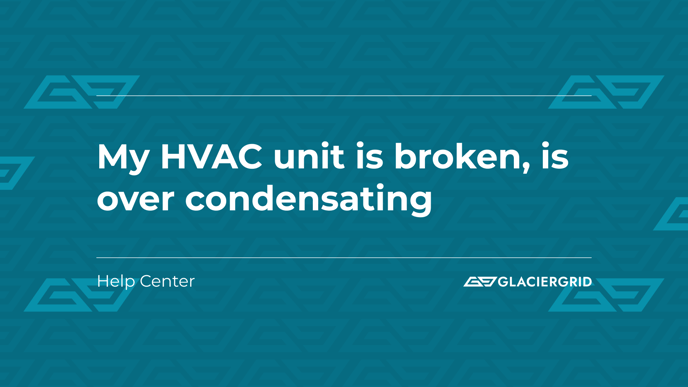In this guide, we'll discuss what to do if you suspect your HVAC unit is overcondensating and how to address the problem effectively.
Is Your HVAC Unit Overcondensating?
Excessive moisture production in your HVAC system, also known as overcondensation, can be worrisome. However, it's important to understand that GlacierGrid primarily controls heating and cooling setpoints. If you're facing issues with moisture or condensation, it may not be directly caused by the thermostat system.
What to Do When Your HVAC Unit is Overcondensating:
If you notice excessive condensation or moisture around your HVAC unit, it's important to take the following steps:
- Turn Off the HVAC Unit: For safety reasons, turn off your HVAC system to prevent any potential electrical or water-related hazards.
- Inspect for Leaks: Check for any visible water leaks around the HVAC unit. Leaks can contribute to excess moisture and condensation.
- Check for Clogged Drain Lines: A common cause of condensation issues is clogged drain lines. Inspect the drain lines for any obstructions, and if you find any, remove or clear them.
- Replace Air Filters: Dirty or clogged air filters can restrict airflow, leading to excess moisture buildup. Replace your air filters regularly to ensure proper ventilation.
- Look for Refrigerant Leaks: If your HVAC unit uses refrigerant, a refrigerant leak could be causing condensation issues. This is a complex problem that should be addressed by a qualified HVAC technician.
When to contact a local HVAC technician:
If the issue persists after performing the above checks or if you suspect it's related to the HVAC equipment itself, it's crucial to reach out to a local HVAC technician. HVAC technicians have the expertise and equipment needed to diagnose and troubleshoot equipment-related problems.
When contacting an HVAC technician, provide them with the following information:
- A description of the issue, including when it started.
- Any unusual sounds or odors coming from the HVAC unit.
- The make and model of your HVAC system.
- Details about your recent HVAC maintenance history, if applicable.
We are committed to helping you achieve energy efficiency in your facility. However, when issues arise with your HVAC system that go beyond our control, it's important to seek assistance from qualified professionals.
Addressing condensation issues promptly can prevent further damage to your HVAC unit and maintain a comfortable and energy-efficient workspace.

